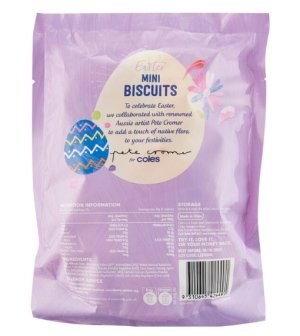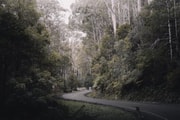Biscuit bug-out: Coles ingredient leaves mum crumbling in disgust!
- Replies 61
As the Easter season hops into full swing, many of us are on the lookout for those special treats that make the holiday extra sweet.
Supermarkets like Coles are stocked with a variety of festive goodies, from chocolate bunnies to hot cross buns.
However, one young mum's recent discovery has sparked a conversation about an ingredient that's left her feeling less than festive.
The mother, eager to please her children's sweet tooth, picked up the Coles Easter Hunt Cookies 15 Pack 150 g ($6.50).
It was a purchase made in good faith, with the expectation of delivering a bit of holiday joy to her family.
However, joy turned to dismay when she later examined the ingredient list at home, and stumbled upon a term that was foreign to her.
‘There's one word in the ingredients list that I've never heard of before, so I Googled it,’ the mum said.
After a quick search, the mum was appalled to learn that ‘cochineal’ is derived from the crushed, dried bodies of female scaled insects.
Her reaction was visceral and immediate: 'Seriously, I am disgusted,' she expressed online. 'Like I don't know why this has to be in these biscuits, but a cochineal [is] crushed, dried bodies of female scaled insects... are you kidding me?'
She labelled the ingredient as 'toxic', and vowed that neither she nor her children would consume the biscuits again.
‘They're going straight in the bin,’ she declared.
The mother also advised others to be cautious about the contents of the food they purchase, using this incident as a clear illustration of why it's essential for parents to always scrutinise the ingredient list before making purchases.
After sharing her personal revelation on social media, numerous Australians expressed confusion at her seeming surprise, with many commenting that they are familiar with cochineal, and its common use as a red dye in food products found on supermarket shelves.
‘Cochineal is used in so many products,’ one comment said.
‘You and your kids have been consuming cochineal your whole lives,’ another explained.
Food Standards Australia New Zealand (FSANZ) has approved the use of cochineal as a food dye, and it's found in a wide array of items, including flavoured milks, lollies, desserts, and more.
Many Australians might be surprised to learn that some of the nation's most beloved brands, such as Arnott's and Kirks soft drink manufacturer, incorporate cochineal in their products.
This means that treats like Tim Tams, Shapes, and even a can of Pasito contain this natural dye.
In 2022, confectionery giant and Nestlé subsidiary Allen's announced it would remove the ingredient from certain lollies to cater to vegan preferences.
Though insects are a part of people’s diets in other countries,, many Down Under would agree that insects and food do not usually go together.
On that note, this mum would be shocked to know about a proposal to address the problem of food insecurity.
 Are you familiar with cochineal and its purpose? Which other ingredients confused you when you saw them on the ingredient list? Let us know your thoughts in the comments below!
Are you familiar with cochineal and its purpose? Which other ingredients confused you when you saw them on the ingredient list? Let us know your thoughts in the comments below!
Supermarkets like Coles are stocked with a variety of festive goodies, from chocolate bunnies to hot cross buns.
However, one young mum's recent discovery has sparked a conversation about an ingredient that's left her feeling less than festive.
The mother, eager to please her children's sweet tooth, picked up the Coles Easter Hunt Cookies 15 Pack 150 g ($6.50).
It was a purchase made in good faith, with the expectation of delivering a bit of holiday joy to her family.
However, joy turned to dismay when she later examined the ingredient list at home, and stumbled upon a term that was foreign to her.
‘There's one word in the ingredients list that I've never heard of before, so I Googled it,’ the mum said.
After a quick search, the mum was appalled to learn that ‘cochineal’ is derived from the crushed, dried bodies of female scaled insects.
Her reaction was visceral and immediate: 'Seriously, I am disgusted,' she expressed online. 'Like I don't know why this has to be in these biscuits, but a cochineal [is] crushed, dried bodies of female scaled insects... are you kidding me?'
She labelled the ingredient as 'toxic', and vowed that neither she nor her children would consume the biscuits again.
‘They're going straight in the bin,’ she declared.
The mother also advised others to be cautious about the contents of the food they purchase, using this incident as a clear illustration of why it's essential for parents to always scrutinise the ingredient list before making purchases.
After sharing her personal revelation on social media, numerous Australians expressed confusion at her seeming surprise, with many commenting that they are familiar with cochineal, and its common use as a red dye in food products found on supermarket shelves.
‘Cochineal is used in so many products,’ one comment said.
‘You and your kids have been consuming cochineal your whole lives,’ another explained.
Food Standards Australia New Zealand (FSANZ) has approved the use of cochineal as a food dye, and it's found in a wide array of items, including flavoured milks, lollies, desserts, and more.
Many Australians might be surprised to learn that some of the nation's most beloved brands, such as Arnott's and Kirks soft drink manufacturer, incorporate cochineal in their products.
This means that treats like Tim Tams, Shapes, and even a can of Pasito contain this natural dye.
In 2022, confectionery giant and Nestlé subsidiary Allen's announced it would remove the ingredient from certain lollies to cater to vegan preferences.
Though insects are a part of people’s diets in other countries,, many Down Under would agree that insects and food do not usually go together.
On that note, this mum would be shocked to know about a proposal to address the problem of food insecurity.
Key Takeaways
- A mum expressed her disgust after discovering cochineal, a dye made from crushed insects, in Coles home brand Easter biscuits.
- The ingredient, which is approved by Food Standards Australia New Zealand, surprised the shopper who was unaware of its common use in food products.
- The story highlighted the importance of checking ingredient lists, as emphasised by the mother, who decided to dispose of the biscuits.
- Despite the initial shock, others noted that cochineal is a widely used ingredient in various food items, including some Australian favourite brands.








